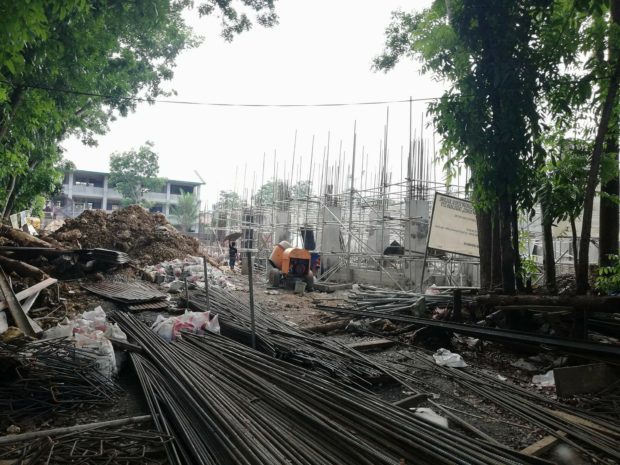‘Sufficient teachers, but no enough classrooms’ in Bohol school

Classroom buildings are still constructed at Dr. Cecilio Putong National High School in Tagbilaran City, Bohol, to answer the needs of the lack of classrooms. The school has the biggest population in Bohol province with 6,000 enrollees. Inquirer Visayas / Leo Udtohan
TAGBILARAN CITY, Bohol – Students at Dr. Cecilio Putong National High School (DCPNHS) were greeted with noise from an on-going construction of adjacent two classroom buildings during the first day of classes on Monday.
The backhoe drilling could be heard from the school’s gymnasium while some 1,200 Grade 7 students were waiting for their classroom assignments.
Overcrowded classrooms and a lack of school desks were the common problems reported on the first day of classes, according to assistant school principal Melchor Daniel, Jr.
“We have sufficient teachers, but no enough classrooms,” he told the Inquirer.
He said the 4-story two classroom buildings will soon have 40 classrooms to answer their needs.
Article continues after this advertisement“The new buildings are still being constructed and I don’t think they can be completed anytime soon. Hopefully, this can answer our classroom needs,” Daniel said.
Article continues after this advertisement
Classroom buildings are still constructed at Dr. Cecilio Putong National High School in Tagbilaran City, Bohol, to answer the needs of the lack of classrooms. The school has the biggest population in Bohol province with 6,000 enrollees. Inquirer Visayas / Leo Udtohan
DCPNHS has the biggest student population in Bohol province. As of Monday, they have 6,000 students – and counting.
Daniel said they had to adopt the double shifting scheme to accommodate all enrollees. The first shift is from 7 a.m. to 12 noon, and the second shift is from 1 p.m. to 7 p.m.
Daniel said some classes have to be relocated to their makeshift classrooms or temporary shelters “because we simply can’t accommodate all our students.”
The school was likewise forced to refuse transferees, Daniel noted, and only accommodate old students who still have to enroll.
“Unfortunately, we are now refusing enrolment because of the classroom problem and we simply cannot accommodate everybody. Everybody wants to come to our school but we can (only) take in so much,” he said.
Meantime, teachers have to deal with 50-60 students per class, and even take on several classes.
There were at least 220 teachers at DCPNHS. Some teachers opted to use lapel mic during classes to preserve their voice and prevent fatigue.
At the faculty room, Grade 7 teacher Brigida Badlon was checking her lapel mic before proceeding to class.
Badlon, 39, has been using lapel mic in her classes for the past six years.
According to her, using lapel mic has provem practical and effective since it enabled her to overcome usual classroom noises and distractions like the clatter of students hustling through the hallway and sound from an on-going construction of classroom buildings.
“It helps me not to raise my voice and it relaxes me,” said Badlon, who bought her own lapel mic. /kga
